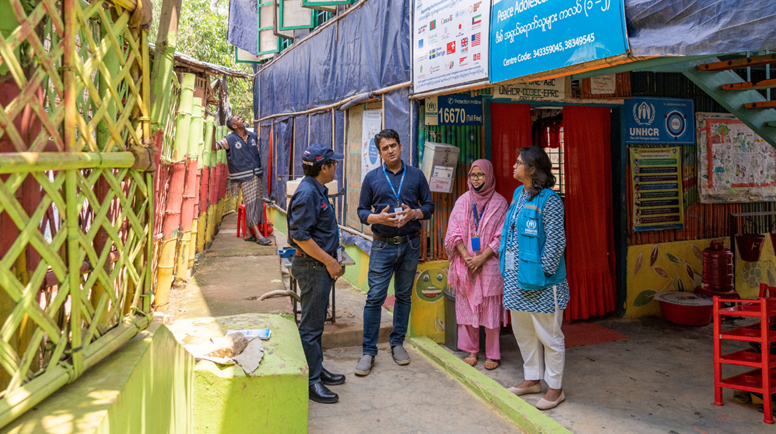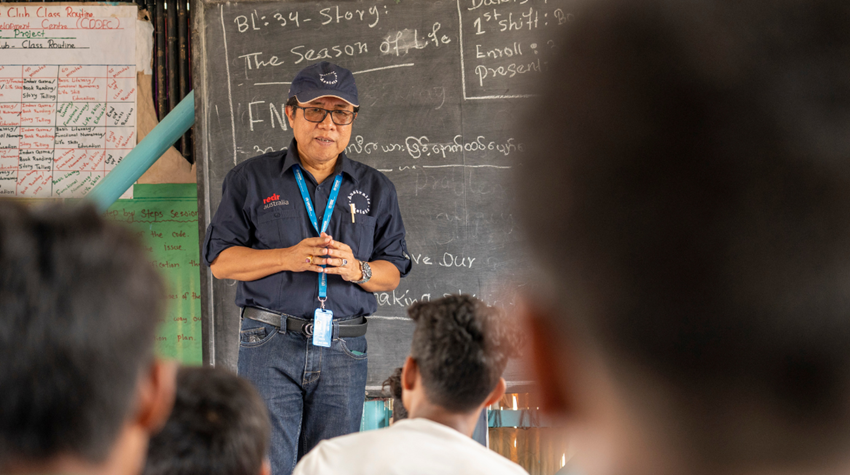During his most recent deployment with the Australia Assists Program, Budi worked as an education officer with the United Nations High Commission for Refugees (UNHCR) on education programming for adolescents and youth.
Working in Cox's Bazar, Bangladesh, with youth from both the refugee camps and the host communities, Budi's efforts have touched the lives of thousands of young people. Collaborating with almost 150 adolescent centres across the sprawling camps, his work included reviewing the level of education provided, learning processes and current curricula to develop high-quality education support.
Budi says “a lack of curriculum and qualified teachers” are the main challenges faced by educators in Cox’s Bazar. “That’s why youth have been reluctant to attend the education centres.”
But Budi has worked to improve these issues. “My biggest achievement so far is that I have developed a monitoring system for the adolescent centres. I give feedback to them to improve their achievements. We visit them every month to help them build on successes.”
The Minimum Standards for Adolescent Centre framework, developed by Budi, helps class facilitators to understand what needs to be done to provide youth from both communities with high-quality education and skills development.
Budi also mentored teachers on creating lesson plans—supporting both their professional development and outcomes for students. “It can improve the quality of learning methods and will contribute to the quality of education for young people,” explains Budi.
Living and learning in Cox's Bazar
Around one million Rohingya refugees are currently living in camps in Cox’s Bazar, and many have been there for more than five years. More than half who fled their homes are children, who need special protection and have specific needs, such as continuing education.
Education services in Cox’s Bazar are an important way to give young people in the camps hope for the future, as well as provide stronger education outcomes for local children. Budi's work as a UNHCR education officer is helping to ensure young people in both the refugee camps and host communities have access to meaningful learning opportunities, growth and purpose.
The Australian government is providing lifesaving humanitarian assistance for Rohingya and host communities in Cox’s Bazar and the Australia Assists Program is one important part of this support. Deploying technical experts such as Budi helps to support social protection reforms, skills development, and gender equality to drive inclusive growth.
Creating safe spaces for youth
Times of crisis can lead to an increase in gender-based violence, exploitation and early marriage for children and youth. Due to the vulnerabilities these young people face, Budi regularly coordinated with colleagues working on child protection, gender-based violence, community-based protection, livelihoods, gender, inclusion and health.
A session on early marriage and the prevention of sexual exploitation and abuse (PSEA) has been incorporated into the adolescent curriculum. “This session will have a significant impact,” says Budi. “Before, many youths were being pushed by their parents and community to marry at 13 and 14 years old. Now, after participating in the early marriage session, they are aware that marriage should occur after 18 years of age.”
The session also covers PSEA, including what it is and what to do if faced with a sexual abuse or exploitation case. “All of the learners and facilitators are aware now how to report a case to the UNHCR Toll-Free Number,” says Budi. “Hopefully, this can reduce the number of cases the community experiences.”
 Budi and colleagues outside an adolescent centre.
Budi and colleagues outside an adolescent centre.
Supporting local expertise and culture
Children have the right to be educated in their own language, with respect paid to their home culture. Budi worked with Rohingya educators to ensure curricula in the camps are culturally appropriate.
Many of the adolescent centre facilitators are Rohingya themselves. Budi partnered with them to adapt the prevocational curriculum previously in place and make it more relevant to the youths’ context and culture. He also ensured subjects such as 'life skills' are culturally appropriate, so young people have the best educational outcomes possible in their difficult learning environment.
Collaborating to build an inclusive future
Inclusion in education has been a focus of Budi’s deployment. He has worked to ensure 50 per cent of the facilitators in the adolescent centres are women, and that a person living with a disability is included as a facilitator also. Monitoring tools assessing educational quality also tested for gender equality and disability inclusion, to support the educators’ understanding of equality, awareness and respect.
To strengthen disability inclusion in particular, Budi worked with UNHCR partners to provide training to facilitators and teachers, and to mandate that people living with disabilities were included and welcomed in all adolescent centres.
“I’m proud of being deployed by Australia Assists,” says Budi, who finalised his work in Cox’s Bazar in November.
The Australian government proudly supports education in emergencies as part of the Australia Assists Program, which sends hundreds of skilled experts like Budi to crises in our region, and around the world.
Read more about the inspiring technical experts representing the Australia Assists Program.


